Lecture 15 Inversion 倒装
高二英语倒装 (Inversion) 语法讲解及专题练习
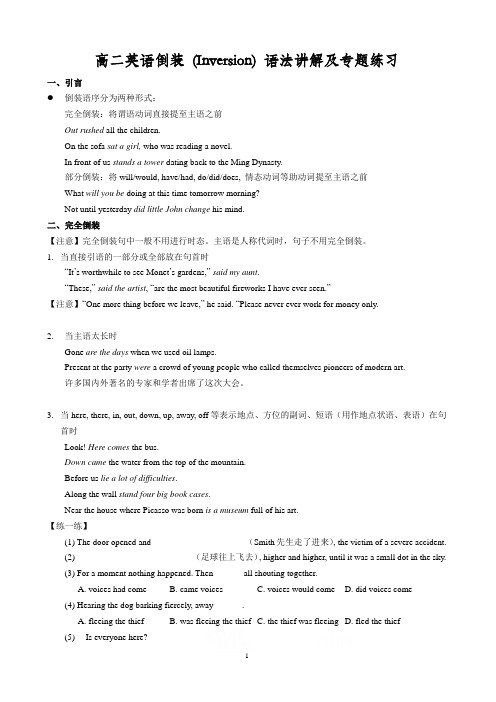
高二英语倒装(Inversion) 语法讲解及专题练习一、引言倒装语序分为两种形式:完全倒装:将谓语动词直接提至主语之前Out rushed all the children.On the sofa sat a girl, who was reading a novel.In front of us stands a tower dating back to the Ming Dynasty.部分倒装:将will/would, have/had, do/did/does, 情态动词等助动词提至主语之前What will you be doing at this time tomorrow morning?Not until yesterday did little John change his mind.二、完全倒装【注意】完全倒装句中一般不用进行时态。
主语是人称代词时,句子不用完全倒装。
1. 当直接引语的一部分或全部放在句首时“It’s worthwhile to see Monet’s gardens,”said my aunt.“These,”said the artist, “are the most beautiful fireworks I have ever seen.”【注意】“One more thing before we leave,” he said. “Please never ever work for money only.2. 当主语太长时Gone are the days when we used oil lamps.Present at the party were a crowd of young people who called themselves pioneers of modern art.许多国内外著名的专家和学者出席了这次大会。
____________________________________________3. 当here, there, in, out, down, up, away, off等表示地点、方位的副词、短语(用作地点状语、表语)在句首时Look! Here comes the bus.Down came the water from the top of the mountain.Before us lie a lot of difficulties.Along the wall stand four big book cases.Near the house where Picasso was born is a museum full of his art.【练一练】(1) The door opened and ______________________(Smith先生走了进来), the victim of a severe accident.(2) __________________________ (足球往上飞去), higher and higher, until it was a small dot in the sky.(3) For a moment nothing happened. Then ______ all shouting together.A. voices had comeB. came voicesC. voices would comeD. did voices come(4) Hearing the dog barking fiercely, away ______.A. fleeing the thiefB. was fleeing the thiefC. the thief was fleeingD. fled the thief(5) ---Is everyone here?---Not yet. Look, there ______ the rest of our guests!A. comeB. comesC. is comingD. are coming(6) From the window ______--- there must be a concert in the hall.A. sound of music cameB. came sound of musicC. did sound of music comeD. did come sound of music(7) There on the ground ______ a poor girl of sixteen years old.A. did layB. did lieC. laidD. lay(8) In the middle of the square ______ with a statue of a hero on top of it.A. stands a stoneB. does a stone standC. a stone standsD. a stone does stand(9) Between the two rows of trees ______ the teaching building, which ______ built in the 1990s.A. stands; wasB. stand; wasC. stands; wereD. stand; were(10) At the meeting place of the Yangtze River and the Jialing River ______, one of the ten largest cities inChina.A. lies ChongqingB. Chongqing liesC. does lie ChongqingD. does Chongqing lie(11)______ and the mouse was caught.A. Up the cat jumpedB. The cat up jumpedC. Up jumped the catD. Jumped up the cat4、such pron.“这样的人(或事物);上述的人(或事物)”Accountants were boring. Such was her opinion before meeting Ian.做会计的个个乏味。
Inversion倒装

Inversion倒装按“主语+谓语”这种顺序排列的句子是陈述语序,如果将某个句子成分移至句首而引起主语和谓语顺序的颠倒,使句子的排列顺序变为“谓语(或谓语的一部分)+主语”就是倒装句。
倒装有两种情况:完全倒装和部分倒装。
一、完全倒装Full Inversion (主语和谓语完全倒置)1.在there, here引导的表示存在的句型中,谓语是be,exist,stand,lie ,live等表示状态的不及物动词。
eg. There was a mountain long long ago. (从前有座山)There stood a temple at the top of the mountain. (山上有座庙。
)There loved three monks in the temple. (庙里有三个和尚。
)2.句子谓语是go,come,run等表示位置移动的动词和be动词,句中又有表示方位的副词(here,there,off,up,down,out,in,away等),当其主语为名词时,为了强调该副词,可将其放于句首,后面用陈述句语序,即主谓不倒装。
eg. There goes the bell ! 铃响了!Here comes your husband ! 你丈夫来了!Down come the rain ! 下雨了。
Here comes the train to Beijing. 去北京的火车来了。
Off goes the woman ! 那个女人走了。
Away went the boy to the school. 那男孩子到学校里去了!Here she comes. 她来了。
Here you are . 给你。
3.副词now,then,thus引导的句子里,谓语是come,follow,begin,and,be等。
eg. Now comes your turn !Then followed a shot of gun !Thus ended the meeting !4.为了强调句中的状语或表语,为了保持句子平衡或上下文衔接紧密,在叙述性和描绘性的书面语中,句中主语和谓语完全倒装,可将状语或表语置于句首。
Inversion倒装

B
A. hangs
B. hang
C. hanging
D. hanged.
3. Only after liberation _____ B to be treated as human beings. A. they began B. did they begin
C. began they
C. do they begin
A. you can arrive there B. can you arrive there --- I don’t know, _____. B A. nor don’t I care C. I don’t care neither B. nor do I care D. I don’t care also B. arrive there you can D. there you can arrive
A. did the villagers realize B. the villagers realized
C. the villagers did realize
D. didn’t the villagers realize
7.Only by taking a taxi _____ C on time.
倒装句 inversion
主语和谓语是句子的核心,它们之间有两种 语序: 一是主语在谓语之前称为自然语序 (Natural Order); 二是主语在谓语之后则称为倒装语序 (Inverted Order)。 而倒装语序中又有完全倒装(Full Inversion)和部分倒装(Partial Inversion)
8. --- Do you know Jim quarrelled with his brother?
Inversion倒装

Inversion倒装 倒装
2. 以否定词开头作部分倒装 , 如 Not only…but 以否定词开头作部分倒装, also, Hardly/Scarcely…when, No sooner… than等. 等 Not only did he refuse the gift, he also severely criticized the sender. Hardly had she gone out when a student came to visit her. No sooner had she gone out than a student came to visit her. 注意:只有当Not only… but also连接两个分句时, 连接两个分句时, 注意:只有当 连接两个分句时 才在第一个分句用倒装结构. 才在第一个分句用倒装结构 . 如果置于句首的 Not only… but also仅连接两个并列词语,不 仅连接两个并列词语, 仅连接两个并列词语 可用倒装结构. 可用倒装结构. Not only you but also I am fond of music.
Inversion倒装 倒装
3. so, neither, nor作部分倒装 , 表示 " 也 " , 作部分倒装, 作部分倒装 表示" 也不" "也不". Tom can speak French. So can Jack. If you won't go, neither will I. 注意: 注意 : 当 so引出的句子用以对上文内容加以证实 引出的句子用以对上文内容加以证实 或肯定时 , 不可用倒装结构 . 意为 " 的确如 此". Tom asked me to go to play football and so I did. ---It's raining hard. ---So it is.
倒装(Inversion)

倒装(Inversion)有时为了强调某一部分,或适应一定的语法结构的需要,而把谓语的全部或一部分提到主语的前面,这种情况叫“倒装”(Inversion)。
分为全部倒装与部分倒装。
1全部倒装1. 在there(appear to/happen to/seem to/used to/will)be /exist/lie/live/remain/come 结构中There exist many ancient temples. /There remainsa more difficult task.2. (1)在以here,there,now,then,out,in,up,down,away 等副词开头的名子里There goes the bell. /Out rushed the children.△但主语是人称代词时,主语和谓语的语序不变Here it is.(2)为了保持句子的平衡,或为了强调表语或状语,将其置于句首,主谓完全倒装In a big bed of a big room lies a big man. / Present at the meeting were CEOs.3.表示祝愿的句子Long live our great country4.直接引语的一部分或全部放在句首时,主语为名词时全部倒装(主语是代词时可倒可不倒)“ Let’s go” he said/said he. / said the man.2部分倒装1. 在疑问句中Is she a student?/ What does your mother do?△若特殊疑问句的疑问词做主语或修饰主语时,仍用陈述语序Who is on duty today?/ Which dictionary is yours?2. only+状语位于句首时Only in this way can you solve this problem.△only 修理饰主语位于名首时不倒装Only socialism can save China.3. 含有否定意义的副词、介词短语或连词位于句首时not,never,hardly,barely,seldom,little,few,nowhere,no,rarely,not only…but (also),not until,hardly/ scarcely… when,no sooner… than,at no time,by no means,in no way,By no means can he catch up in such a shorttime.4. so/such… that.. 句式中,so/such…位于句首时,主句倒装So angry was he that he couldn’t speak. / Such a good boy is he that we all like him.5. ①前提为肯定情况……也So+ be/助动/情动+主语He likes volleyball very much. So do I.②前提为否定情况…也不Neither/Nor+ be/助动/情动+主语I have never been abroad. Neither has he.6. as/though引导的让步状语从句,结构:adj./adv. /n./v原+ as+主语+ 其他Child as he is,he knows a lot. / Oldest as he is,he doesn’t do well in studies.注意:名词和形容词前,零冠词.7. 省略if的虚拟条件句中助词should/ were/had 位于句首时Were I you,I would work hard. / Should it rain tomorrow,we would put off our meeting.。
Inversion倒装句
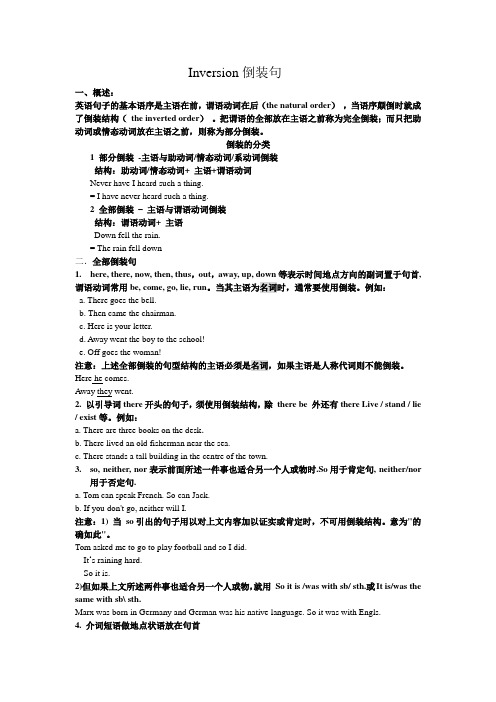
Inversion倒装句一、概述:英语句子的基本语序是主语在前,谓语动词在后(the natural order),当语序颠倒时就成了倒装结构(the inverted order)。
把谓语的全部放在主语之前称为完全倒装;而只把助动词或情态动词放在主语之前,则称为部分倒装。
倒装的分类1 部分倒装-主语与助动词/情态动词/系动词倒装结构:助动词/情态动词+ 主语+谓语动词Never have I heard such a thing.= I have never heard such a thing.2 全部倒装–主语与谓语动词倒装结构:谓语动词+ 主语Down fell the rain.= The rain fell down二.全部倒装句1. here, there, now, then, thus,out,away, up, down等表示时间地点方向的副词置于句首, 谓语动词常用be, come, go, lie, run。
当其主语为名词时,通常要使用倒装。
例如:a. There goes the bell.b. Then came the chairman.c. Here is your letter.d. Away went the boy to the school!e. Off goes the woman!注意:上述全部倒装的句型结构的主语必须是名词,如果主语是人称代词则不能倒装。
Here he comes.Away they went.2. 以引导词there开头的句子,须使用倒装结构,除there be 外还有there Live / stand / lie / exist等。
例如:a. There are three books on the desk.b. There lived an old fisherman near the sea.c. There stands a tall building in the centre of the town.3.so, neither, nor表示前面所述一件事也适合另一个人或物时.So用于肯定句, neither/nor用于否定句.a. Tom can speak French. So can Jack.b. If you don't go, neither will I.注意:1) 当so引出的句子用以对上文内容加以证实或肯定时,不可用倒装结构。
倒装(Inversion)

他。如果谓语放在主语前,这种语序就叫倒
装。倒装分:全倒装和部分倒装。在以下情 况可引起倒装:
• 1.一般疑问句中的倒装 • Don’t you speak English?(部分谓语放 在主语前) • 2.用于There be句型中的倒装 • There will be a meeting this afternoon.
• 2. He little realizes the danger he is in. • Little does he realize the danger he is in. • 3. Bethune was not only a doctor, but he was also a great communist fighter. • Not only was Bethune a doctor, but he was also a great communist fighter.
• 8. The animal hardly makes any movement when it is in its hibernating state. • Hardly does the animal make any movement when it is in its hibernating state. • 9. He had hardly sat down when the telephone rang. • Hardly had he sat down when telephone rang.
• Only then did l realize the trouble she was in. • 只是到了那时我才明白她所处的 困境。 • Not until yesterday did l know the news. • 直到昨天我才知道这消息。
倒装(Inversion)

Hardly could he finish his test paper when the school bell rang .(由于语法要求的原因,本句写成了部分倒装的句子。它的自然语序应该是:When the bell rang, he could hardly finish his test paper.)他还未做完试卷,下课铃就响了。
Have you ever seen such a naughty kid like him !
你见过那个孩子像他这么调皮!
C. 在陈述句中
陈述句在一般情况下用自然语序;但由于英语语法的某些原因,陈述句也要使用倒装语序。这些原因大致可以归纳如下:
1) 为了避免句子部分内容不必要的重复,常用"so + be动词(助动词、情态动词)+主语"或"neither / nor + be动词(助动词、情态动词)+主语"的倒装句式。其中第一个句式表示"与前面所述的肯定情况相同", 第二个句式表示"与前面所述的否定情况相同"。例如:
如:He is a boy and he likes singing. So it is with Tom.
2)具有否定意义的词或短语置于句首时(除否定词修饰主语外),句子一般要写成部分倒装句。这类词或短语常见的有:not, never, seldom, hardly, rarely, scarcely, by no means, under no circumstances, in no way, at no time, no sooner … (than), hardly … (when), not only … (but also), not until… ,等。例如:
高中英语语法专讲 特殊句式之倒装句Inversion

高中英语语法专讲特殊句式之倒装句Inversion 英语句子通常有两种语序:一种主语在前,谓语在后,称为正常语序,另一种谓语在前,主语在后,称为倒装语序。
之所以出现倒装,一方面是因为语法结构的需要,另一方面为了强调或修饰,有时两种原因兼有之。
倒装句分为全部倒装和部分倒装。
另外,英语句子的倒装一是由于语法结构的需要而进行的倒装,二是由于修辞的需要而进行的倒装。
前一种情况称之为语法倒装 ,倒装是必须的,否则就会出现语法错误;后一种情况称之为修辞倒装 ,倒装是选择性的,倒装与否只会产生表达效果上的差异。
一、【全部倒装】把整个谓语部分放在主语之前。
注意:谓语动词的数要与后面的主语保持一致。
1、用于地点副词here, there,方位副词out, in, up, down及时间副词now, then等开头,谓语动词为be, stand, lie, come, go, fall等的句子里,以示强调。
【语法倒装】There goes the bell. Look! Here comes the bus.这种倒装要求:主语必须是名词。
而当主语是代词时,主语和谓语语序不变。
Here it is. Here you are. Away he went. Here we go.注意:这类倒装句式一般只用一般现在时和一般过去时时态。
Here comes Miss Young. Out rushed the boys.[小练]汉翻英1)紧接着了三天大雨。
Then followed three days of heavy rain.2)我们期盼已久的时刻来了!Now comes the hour we have been looking forward to.2、当表示地点的介词短语放句首时。
注意:谓语多为be, lie, sit, stand, come, walk等不及物动词且这类倒装句式一般只用一般现在时和一般过去时时态。
inversion(倒装)
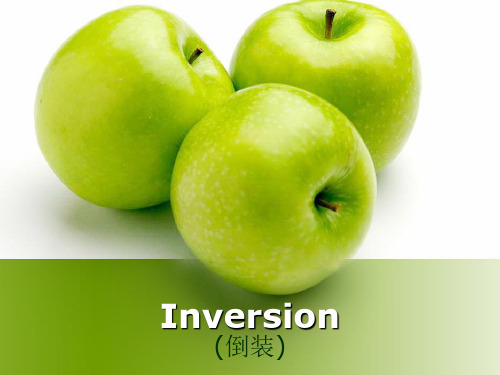
3. 让步状语从句中的as倒装结构. n./adj./adv./v.+as (though)+主语+谓语, 表示让步意义,相当于though引导的从句 Short as it was, he can’t understand the English film. Student of English as he is, he can’t understand the movie. (零冠词). Much as we tried, we failed to get the expected result. Search as they would, they could find nobody in the house.
子平衡,或为了强调表语或状语, 或使上下文紧密衔 完全倒装. 接时, 完全倒装 In the center of the square stands a high monument. On either side of the road were rows of houses. On the back wall hung a huge oil painting. Under the tree was sitting a girl.
2. 部分倒装. 结构: 提前成分+情态动词 主语 主要动词 情态动词+主语 主要动词) 情态动词 主语+(主要动词 或助动词
(1) 句首为含有否定意义的副词或副词片语 如never, 否定意义的副词或副词片语, 否定意义的副词或副词片语 little, seldom, rarely, not, hardly, no sooner, scarcely, nowhere, at no time, by no means, in no way, in no case, on no account, in no time, under/in no circumstances, no longer, in vain, not until, etc.
倒装(Inversion)

三、 平衡结构
2. 以表语开头的句子 有时为了把较长的主语放在 以表语开头的句子:有时为了把较长的主语放在 后面,须将表语和谓语都提到主语前 须将表语和谓语都提到主语前。 后面 须将表语和谓语都提到主语前。 例子: Such would be our home in the future. 我们将来的家就是这个样子。 3. 以副词 以副词here , there开头的句子 也采用完全倒 开头的句子,也采用完全倒 开头的句子 装来保持句子平衡。 装来保持句子平衡。 例子: Here is the letter you have been looking forward to.
二、 承上启下
为了避免句子部分内容不必要的重复,常用 为了避免句子部分内容不必要的重复,常用"so+be动词 动词 助动词、情态动词) 主语 主语"或 (助动词、情态动词)+主语 或"neither/nor + be动词 动词 助动词、情态动词) 主语 的倒装句式。 主语"的倒装句式 (助动词、情态动词)+主语 的倒装句式。 例子: A:His brother is(not) a college student; B:so is is not mine.(nor is mine .) A:他弟弟(不)是大学生,B:我弟弟也是。(我弟弟也 不是。) A:He used to have his further study abroad; B:so did I.(neither did I.) A:他曾去国外深造过。B:我也去过。(我也没有。)
一、 表示强调:
2. hardly,in no way,little,scarcely,seldom,never,no more, no longer,not, not only, no sooner, not only … (but also),not until… 等具有否定意义的词或词组位于句 等具有否定意义的词或词组位于句 否定意义的词或词组 句子用部分倒装。 首,句子用部分倒装。 句子用部分倒装 例子: No sooner had I got home than it began to rain. 我刚到家就下起了雨。 Seldom do I go to work by bus. 我很少乘公共汽车上班。 Not until twelve o'clock did she go to bed last night . 她昨晚十二点才上床睡觉。
Inversion 倒装句
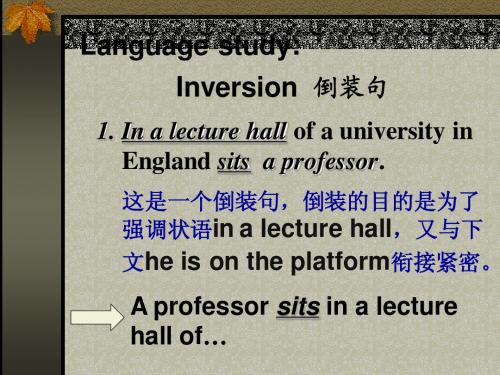
6.___ a very tall building in the B south of the city.
A. There standing B. There stands
C. It stands
D. Standing 7. – It’s very cold today. C -- ____. A. So is it B. So was it C. So it is D. So it was yesterday
7. Long live our motherland!
表示祝愿的句子,全部倒装;若带有情态
动词则部分倒装。
A. Long live China! B. May you succeed.
Let’s try: 1.Not only does he play football (他不仅 ______________________
A. Boy as he is B. A boy as he is C. Though he is a boy D. Though is he a boy
9. ___ , there would be no C modern industry.
A. There were no steel B. There was no steel C. Were there no steel D. Was no steel there
10. ____, he knows much about A science.
4. On the wall _____ a photo C of his grandfather. A. was hanging B. hanged C. hung D.was hung 5. No sooner _____ than the B train left.
倒装句(Inversion)

倒装句(Inversion)一.倒装分为全部倒装和部分倒装。
谓语的全部放在主语之前,叫全部倒装;谓语动词不放在主语之前,而借助于助动词、情态动词等放在主语之前引起倒装,叫部分倒装,也叫局部倒装。
二.倒装的原因:一是语法结构的需要(如某些疑问句);一是为了强调。
三.用法:1.以here, there或out ,in ,up ,down ,away等副词开头的句子里,以示强调。
Eg : A : There goes the bell . B: Here comes the bus .C: Out rushed the children . D: Away went the boy .注:主语是人称代词时,主语和谓语的语序不变。
Eg: A: Here it is !B : Away he went .2. Only 修饰的副词、介词短语或状语从句放句首时。
Eg: (1) Only then did I realize that I was wrong .(2) Only in this way can you learn from your mistakes .(3) Only when the war was overin 1918was he able to gethappily back to work .3. 含有否定意义的副词或连词放句首时。
(1)never / seldom / littleeg : A. Never shall I forget it .B. Never have I heard such astrange story .C. Seldom did I hear such astrange story .D. Little does he care aboutwhat others think .(2)not / not until / not only ---butalso / neither--- noreg: A. Not a single mistake did he make .B. Not until midnight did the rain stop .C. Not only is he a worker , but also he is a writer .D. Neither is he a worker , nor is he a writer .(3)Hardly ---when / Scarcely---when / No sooner---thanEg: A. Hardly / Scarcely had Ireached the bus stopwhen the bus started .B. No sooner had I returned home than the telephone rang .4.副词so 放句首,表示前面所说的情况也适用于另一人或物。
inversion高中倒装句讲解汇总

否定意义副、连词,既 不。。。也不。。。须 倒装 (neither…nor…)
not only开头句,前一分句 要倒装
巩固练习: 10) ________ himself wrong, but his friends were wrong. A. Not was only he B. Not only he C. Not only was he D. Not only was 11) ________ write the words to the song, but he also composed the music. A. Not only did the famous director B. Not only the famous director C. The famous director not only D. Not only the famous director did
运动方向的副词away, in, out, on, down, up, off, back等放在句首, 通常 用全部倒装。 如:There was a sudden gust of wind and away went his hat. 但主语为人称代词时,不用倒装。 如:Back they came.
巩固练习: 7) Only in this way ________ make progress in your English. A. you B. can you C. you be able to D. will you able to 8) Only when the meeting was over________ go back to meet his friend. A. he could B. he was able to C. was he able to D. was able to he
英语语法 什么情况下需要使用倒装语序
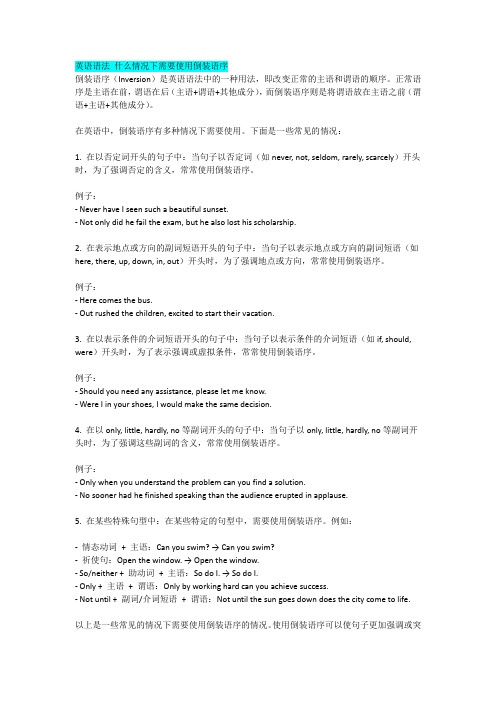
英语语法什么情况下需要使用倒装语序倒装语序(Inversion)是英语语法中的一种用法,即改变正常的主语和谓语的顺序。
正常语序是主语在前,谓语在后(主语+谓语+其他成分),而倒装语序则是将谓语放在主语之前(谓语+主语+其他成分)。
在英语中,倒装语序有多种情况下需要使用。
下面是一些常见的情况:1. 在以否定词开头的句子中:当句子以否定词(如never, not, seldom, rarely, scarcely)开头时,为了强调否定的含义,常常使用倒装语序。
例子:- Never have I seen such a beautiful sunset.- Not only did he fail the exam, but he also lost his scholarship.2. 在表示地点或方向的副词短语开头的句子中:当句子以表示地点或方向的副词短语(如here, there, up, down, in, out)开头时,为了强调地点或方向,常常使用倒装语序。
例子:- Here comes the bus.- Out rushed the children, excited to start their vacation.3. 在以表示条件的介词短语开头的句子中:当句子以表示条件的介词短语(如if, should, were)开头时,为了表示强调或虚拟条件,常常使用倒装语序。
例子:- Should you need any assistance, please let me know.- Were I in your shoes, I would make the same decision.4. 在以only, little, hardly, no等副词开头的句子中:当句子以only, little, hardly, no等副词开头时,为了强调这些副词的含义,常常使用倒装语序。
例子:- Only when you understand the problem can you find a solution.- No sooner had he finished speaking than the audience erupted in applause.5. 在某些特殊句型中:在某些特定的句型中,需要使用倒装语序。
Inversion倒装

Etopialu 2020/5/14
Inversion 倒装 将某些句子成分移至句首而引起主语和谓语语序的颠倒,
称义(inversion)。倒装分为完全倒装和部分倒装两种。
1.完全倒装
1)结构:提前成分+谓语动词+主语 2)类型 a.将状语here,there 前移,谓语动词一般为be,come,go。 例如: There goes the bell. Let's begin our class. 但当主语为人称代词时不引起倒装。例如:Here he comes. b.表示位置转移的副词如up,down,in,out,away
Enjoy English!
Etopialu 2020/05/14
4. He spoke so impressively that everyone listened in awed silence. So _im__p__r_e_s_s_iv__e_l_y__d_i_d__h_e__s_p_e__a_k__t_h_a_t__e_v__e_r_y_o_n__e__li_s_t_e_n__e_d_ i_n__a_w__e__d__s_il_e_n__c_e_._
但only修饰其他成分不引起倒装。 Only Miller has got the invitation.
2.部分倒装
e. not only..but also...结构中当not only位于句首时not only 部分引起部 装。注意but also部分不引起倒装。 Not only could he drive but also he could ride a horse. 但not only...but also连接的并列主语不引起倒装。 Not only the children but also the grown-ups took interest in the cartoon. f.虚拟条件句的倒装结构 h.让步状语从句中的as倒装结构
- 1、下载文档前请自行甄别文档内容的完整性,平台不提供额外的编辑、内容补充、找答案等附加服务。
- 2、"仅部分预览"的文档,不可在线预览部分如存在完整性等问题,可反馈申请退款(可完整预览的文档不适用该条件!)。
- 3、如文档侵犯您的权益,请联系客服反馈,我们会尽快为您处理(人工客服工作时间:9:00-18:30)。
Lecture Fourteen InversionI.Definition and classificationInversion here refers to the word order in sentences that runs against the normal/natural one, for example, (A)VS instead of SV(A), PSV instead of SVP etc.English Inversion may be classified into 1)structurally, Partial Inversion and Complete Inversion:e.g. 1) May our friendship live long!Not a single book had he read that month.At no time must this door be left open.c.f.Up went the flag.She was angry and so was I.Here comes my brother.and 2)functionally, Grammatical Inversion and Rhetorical Inversion, which will be discussed below.II. Grammatical Inversion, required by grammar rulesed in Interrogative Sentencese.g. Are you going on a diet?Do you write good English?What are you looking for?How can you be so rude to her?ed in Exclamatory Sentencese.g. What a tall building it is!How beautiful the flowers are!ed in Existential Sentencese.g. There is a gentleman asking to see you.*** c.f. How many boys are (there) in the classroom?What is (there) on the desk?ed in sentences expressing wish or concessione.g. Long live our beloved motherland!May you both be happy.Old as she is, she never stops learning.ed in clauses expressing unreal conditions without the use of “if”e.g. Had they arrived earlier, they would have caught the bus.Were it to happen / Should it happen, it will cause a great deal of trouble.ed in clauses beginning with so, nor/neither indicating the same condition/in the foregoing clausee.g. He might fail and so might he.I don’t know, nor do I careI can’t speak French. ---- Nor can I.My brother is ill this week. --- So is my sister.*** c.f. Bill smokes too much. --- So he does (Yes, indeed. He smokes too much.)III. Rhetorical Inversion, for some rhetorical effected in sentences beginning with adverbs expressing time, place, position,frequency, manner, etc. for emphasis, exclamation, etc.e.g. Now comes your turn.There comes the bus!Here is your change!Up jumped two large boys.Away went the car like a whirlwind.Out rushed the man and his wife.Often had I intended to speak of it.Loud and clear rang the bell.Bang! bang! bang! came three reports of guns.(* onomatopoeic words)Click-click went the weaving loom. (* onomatopoeic words)*** When the subject is a pronoun, the SV order is required.e.g. There he comes!Out he ran!ed in sentences beginning with prepositional phrases, for emphasis, smoothtransition, etc.e.g. Before him stood the strong tall man.From the dark corner arose a poorly dressed old man.Back into the room ran the little boy.On the hill stands a castle.In the cottage lived a family of six.ed in sentences beginning with adjectives(predicative), for vividness,emphasis, smooth transition, etc.e.g. Green is the mountain and blue is the sea.His face was stony and even stonier was the tone of his voice.ed in sentences beginning with the objects(nouns), for emphasis, smoothtransition, etc.e.g. Many and many things has he had to do.Greater efforts should we make to improve our teaching.Not a finger did I lay on him.ed in the Adverbial Clause of Manner or Concession introduced by ase.g. They go to concerts frequently, as do their parents.She travelled a lot, as did most of her friends.Terrible as was the storm, we continued our way.Pitch-dark as was the night, I still found my way home.*** When the subject is not a noun but a pronoun, the normal/natural order is used. e.g. Poor as he was, he was honest.ed in the Reporting Clause when its subject is in need of emphasis or istoo longe.g. “What do you mean?”asked Henry.“Who’s paying?”shouted the fat man at the counter.*** In news reports, the Reporting Clause at the beginning of the sentence is often inverted.e.g. Says Craig Sparks, chairman of the committee, “We have raised about$ 1500, which will help a lot.”ed in sentences beginning with negative words/phrases/clause (adverbial)such as: little, never, seldom, rarely, not until, nowhere, in no way, in no case, at no time, by no means, under no circumstances, neither, nor, not only …but (also), no sooner … than, hardly … when, scarcely… when/before, etc.e.g. Little does he care whether we live or die.Hardly had I left the place when the trouble started.Scarcely had he finished the paper when/before the bell rang.Not for the world would he let his children go hungry.Never before had so many people gathered on the square.Not until he had made sure of the news did he announce it.We were lucky, for no sooner had we returned home than it began to rain. Not only is he good at basketball, but also at other sports.Not only did he dislike the way she spoke, but he also disapproved of the way she dressed.ed in sentences beginning with only …, so(a./ad.)…(that), at such length(s)/ to such a degree / to such an extent … (that), for emphasise.g. Only then did I understand what he meant.Only in this part of the city will the police find the criminal.So hard did he work that he soon felt tired.To such length did he go on with his speech that most of us began to doze off.To such an extent / To such a degree was the car damaged that it could not be repaired.。
